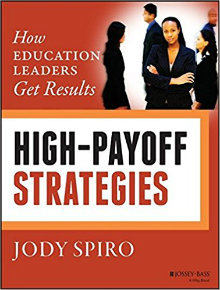How Education Leaders Can Get Good Results
High Payoff Strategies: How Education Leaders Get Results
By Jody Spiro
(Wiley/Jossey-Bass, 2015 – Learn more)

A principal or head of school seeking to improve teaching and learning and create lasting change in her school would benefit from reading High Payoff Strategies. Although this book was geared toward educational leaders who clearly have power to implement major change, as a teacher-leader I also found aspects of this book useful in my own professional work.
This book, written by the Director of Education Leadership at The Wallace Foundation and based on Wallace’s extensive school leadership research, discusses three key strategies that effective educational leaders use to get results. The book is divided into these sections:
- Part 1- Strategy: Culture
- Part 2 – Strategy: Instructional Improvements
- Part 3 – Strategy: Learning Communities
- Part 4 – The Payoff

The essential building blocks for any change initiative
For each of the three strategies – culture, instructional improvements, and learning communities – Spiro describes the essential building blocks for any change initiative and gives examples of how the building blocks apply to the given strategy.
According to Spiro, once a leader has selected a high payoff strategy, to get results the leader needs to use these three strategies:
(a) get buy-in,
(b) start with an early win, and
(c) provide ongoing support.
As a teacher-leader who is currently trying to implement peer coaching/teacher rounds as well as schoolwide design thinking projects in my middle school, I found the notion of these three building blocks especially useful. They can apply to any change initiative and gave me a clear framework for the process of implementing change.
Starting with an early win for buy-in
Though most leaders likely already seek buy-in and give all stakeholders “a greater influence on decisions,” I hadn’t considered Spiro’s idea of starting with an early win which is “an early demonstration of concrete results to persuade doubters that there is benefit in the chosen approach” (p.8).
For example, if PLC members read a book together and have a fruitful discussion, the book discussion might be an early win that cements teachers’ commitment to continue to learn together.
Ongoing support is essential (and coaches highly desirable)
Finally, though it is obvious to most teachers that ongoing professional learning support is essential, too often educational leaders skimp on this step or assume that after teachers have done a strategy once then they have mastered it and will seamlessly integrate it into their practice. This is often the point at which change initiatives begin to come unglued.
Spiro identifies several ways of offering ongoing support, including allocating time to meet, coaches, financial resources, and ongoing professional development.
Spiro asserts, “Time and again when principals are asked what the single most important ongoing support they can offer that has led to success, the answer is instructional coaches” as they are “the very definition of ongoing support” (p.70).
My own experience bears this out, as my school dramatically improved students’ writing abilities and conceptual math abilities with the ongoing support of coaches.
What can get in the way
Finally, Spiro recognizes that change is a difficult process. For each strategy, she includes a section called “What can get in the way?” which might help a leader figure out why his/her leadership initiative might not be working.
I appreciated this section of the book as it highlighted the idea that despite one’s best intentions, there will be times when leaders will fail – and a leader has to be self-reflective enough and confident enough to figure out a solution and keep working toward his/her vision.
Rebecca Berger has been teaching the middle grades at an independent school for the past ten years. She earned her teaching credential and her MA at Hebrew Union College Jewish Institute of Religion. In 2015 she co-wrote a Middleweb “Future of History” post, How Better Grading Reshaped My Teaching, with Shara Peters.

































